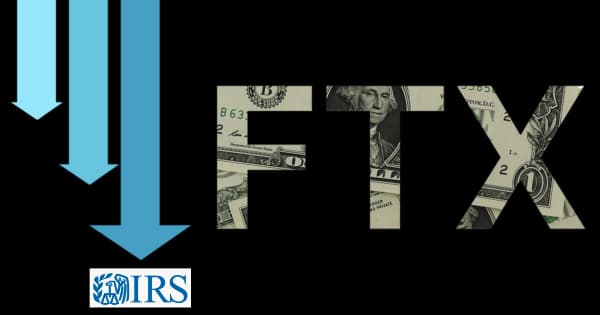Undoubtedly the recent collapse of global crypto exchange FTX is the most painful event in the nascent history of the digital asset industry. The impactful event, which was triggered by a CoinDesk article and several alarmist tweets, wiped out billions of dollars of wealth, resulting in the bankruptcy of over 130 entities and hundreds of thousands of users (millions?) losing their funds.
With FTX becoming insolvent and all funds on the crypto exchange frozen, affected taxpayers are wondering how to report their potential losses on tax returns. Experts generally agree taxpayers who lost money with FTX may benefit from some tax relief.
This post discusses tax implications of the FTX collapse and investment losses.
What Is FTX?
FTX is a crypto exchange promoting liquidity and transaction of coins and tokens. Founded in 2018 by Sam Bankman-Fried, the platform offered various products, including leveraged tokens, volatility products, derivatives, and options. FTX also featured spot trading for more than 300 crypto pairs.
FTX filed bankruptcy November 11, 2022 after several customers withdrew funds earlier in the month and an article in CoinDesk raised concerns about the crypto platform’s financials. As word spread, worried investors offloaded sizable FTX holdings leading to the token devaluation.
Today, all users’ funds remain frozen, preventing customers from accessing their money.
What’s the Difference Between a Capital Loss and Investment Theft Loss?
Capital Loss
A capital loss occurs when a stock or other security is sold for less than the original price. The negative dollar difference between selling and purchase prices is considered a capital loss. Capital losses enable an investor to reduce future capital gains taxes. In a nutshell, a capital loss allows you to recoup part of the losses on your tax returns by offsetting capital gains and other types of income.
Investment Theft Loss
The IRS considers an investment theft loss as the taking or removal of money or assets without your knowledge or consent. This theft must be illegal per state law where it happened and done with criminal intent. An investment theft loss can be deducted by a taxpayer in the year they realize their property was stolen.
The IRS allows taxpayers to deduct up to $3,000 in capital losses from their income annually or $1,500 if they are married and filing separately. Keep in mind other deduction rules may apply to theft losses from Ponzi-type investment schemes.
Is Crypto Capital Loss for Taxes Calculated from the Current Fair Market Value or Original Cost?
You cannot calculate a capital loss based on the current fair market value of the coins or tokens. The IRS states taxpayers should deduct a loss for the original cost basis of the assets. This means the capital loss is based on what you paid to acquire the tokens, not their current price.
Will FTX Investors Be Able to Report Losses for the 2022 Tax Year?
Whether crypto investors will report FTX losses for the 2022 tax year depends on several scenarios.
The following outcomes related to the FTX collapse may affect how you report an FTX loss on your tax return:
- Ideally, the fact that FTX has filed bankruptcy implies affected customers with assets on the platform may still get a percentage of their funds back. Because you could still recover your frozen funds, you should not deduct any losses on your returns. You should also not report any investment gains.
- When it becomes clear you will not recover your funds and the exchange gets shut down, it is advisable to classify the tokens you lost on FTX as “worthless” investment losses. The IRS states that securities such as stocks that become worthless are considered capital losses. Although crypto is not classified as stocks or securities, capital gains and losses from crypto transactions must still be reported on IRS Form 8949.
In essence, you are allowed to report your assets held on FTX as a sale of $0 on the last day of the year when it becomes apparent you will not get your funds back. You will then deduct the cost of the tokens as a capital loss on your Form 8949.
What FTX Account Documents Should You Have for Taxes?
As you wait to see whether you can deduct FTX losses for tax year 2022, consider collecting documents from your FTX account. These documents may include the following:
- History of all transactions, including trades, PNL, and rewards
- Screenshots of funds balances
- Screenshots and documents with your account information
The FTX collapse is stressful for crypto investors. At the very least, there could be some benefits from a tax perspective.
6 Simple Questions. Free Evaluation.
Join our Newsletter
Enter your email address to join our free newsletter. Get all the latest news and updates.

